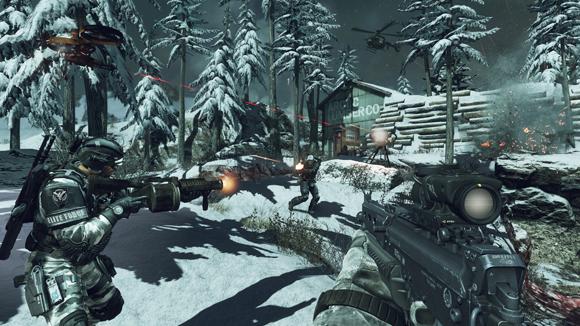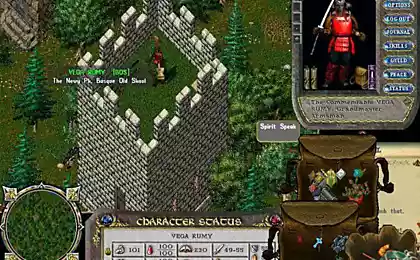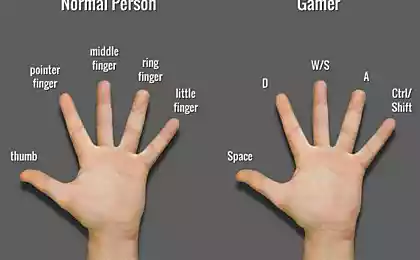1053
Why do gamers again and again to play shooters?

In the spring of 1992 g.Meskit, Texas, expelled from the college student is more than twenty years, the former juvenile delinquents John Carmack (John Carmack) in the sweat of working on a new video game. At its core it was laid on the original principle, which combined first-person view of the Myst i>, a shooter from the Wolfenstein 3D i> and network connection from Spectre i> for to give the game environment unprecedented degree of realism. The following year, Carmack and his five colleagues from id Software i> released Doom i>.
They knew what hit upon something important. "Once we noticed that the janitor who cleaned the boxes and sat down nearby, and for a long time looked at our game», raskazal Carmack journalist of Time i>. By August 1996, it sold 2 million copies of Doom i>, which is why the magazine Wired i> has awarded the title of the game & quot; samoy pupulyarnoy computer game of all time & quot ;. A new sub-genre of games "tend to think." Although the game itself was not the first ever first-person shooter, but it has become a catalyst for the explosive growth in the popularity of the genre. Today, sales of shooters billions of dollars a year, and these games возглавляют bestseller lists for consoles .
What brought shooters such a success? Not only one kind of first-person, three-dimensionality and violence. These properties are inherent in many games today. But shooters all this is connected in some special combination: a virtual environment as possible spurs player to achieve the status that the psychologist Michal Tsikzhentmihaly ( Mihaly Csikszentmihalyi < / a>) calls "flow", a sense of involvement and full of happiness.
"Feed», scientist wrote, "It is a feeling which one nostalgically recalls: "It was fun," or "it was nice". " It is a state where the player disappears the whole world around. According to the scientist, "flow" occurs most often during the game, no matter what: gambling, chess match, or walking in the mountains. For the occurrence of psychological state requires a certain task, a challenge, and sufficient skill to achieve it. We need an environment in which personal identity of a person is transferred to the world of the game and the player has control of the situation. In the end, "flow" becomes self-generating: the feeling itself makes you go back to the lesson, it has generated.
This definition implies that the shooters satisfy all these conditions. "Video games are built on the decisions," said Lennart Neck (Lennart Nacke), Director of the Research Laboratory of games and entertainment at the Ontario Institute of Technology. "First Person Shooters leave no time for reflection. That would be a very simple and boring solution, whether you are not limited in time, it is much more exciting and challenging, when the account goes for a split second. " The game becomes more realistic, the better a person is dissolved in it, immersed in her world. & Quot;
To reach a state of "flow" allows not only first-person view as the shooting itself. "This is the main difference from our daily lives, a situation in which we find ourselves is not usually makes shooters incredibly exciting," says Nack. For this it is not necessarily much to violence in their real life; rather, it is the emotions and impulses that we have to hold back and hide. "Look at it from the point of view of evolution. Most of us are working in the office. We spend the whole day in front of computers. We do not need to go outside and fight with a tiger or a bear for food. But such behavior is "hardwired" into us since ancient times. Our brains are yearning for such a lifestyle, they need stimulation. We do not have enough adrenaline. »
In February 2008 year Knack Craig Lindley (Craig Lindley), specializing in the study of cognitive thinking and managing Лабораторией intelligent systems and perception Australian National Scientific and Industrial Research Organization, decided to find out what is happening with the player at the physical level while playing first-person shooter. Does it somehow to his body? To do this, the scientists monitored the physical condition of the test, playing in Half-Life 2: muscle contraction, heart rate, blood pressure. The experiment was recorded on video, and after the game, participants were asked about their state of health.
The process has been structured in such a way as to consistently bring the players a sense of boredom, dive and finally, the "flow". As uslozheniya virtual environment, increasing the number of opponents and increasing complexity of the game, the person becomes happy and experimental detachment from the real world. They were in a situation calling sensed voltage rise and empathy is happening as you go deeper into the game. Before settling on the first-person shooters, Nack рассматривал options with a third-person shooter ( Kane & Lynch i>) and real-time strategy ( Fragile Alliance i>), comparing the gameplay in different conditions. "In a more casual games most of the problems revolve around problem solving. They do not provide the same degree of immersion of the player and the emergence of "flow", in contrast to the first-person shooter. "Says Nack.
Two scientists were not the first to discover the link between "flow" and shooters. In 2005 published a study that appeared in the top 13, while games and players in the Half-Life 2 i> have demonstrated the highest degree of submerged - the same one in which there is a full touch off from the outside world and involved in the gameplay. Researchers discovered the appeal of such games is not dependent on the plot. The reason lies precisely in the sense of control over what's happening and the need to make decisions. All this, coupled Neck and Tsikzhentmihaly defined as decisive conditions for the emergence of involvement in the game.
Control along with a first-person can be the key to long-term attractiveness as shooters. A fundamental component of our happiness is a sense of control over other people's lives. In fact, this "biological requirements for survival," what and suggests a recent study animals. The more we think we are in control of others, the better we feel. Conversely, the less we are able to influence the situation, the more depressing it affects us. In extreme cases, a complete loss of control leads to a sense of беспомощности and insecurity to the environment. However, our sense of activity often closely linked with our physical activity: whether our body is necessary to change our environment? If so, we begin to feel more confident and stronger. First person shooters bring to the fore our ability to control their environment, and therefore a sense of self-efficacy.
It is unlikely that this attractive factor will soon disappear. In two different studies devoted to локусу Control - we are creating ourselves our own destiny, or our lives are just pawns to external forces - the psychologist Jean Tweng (Jean Twenge) and her colleagues found , that in the period from 1960 to 2002, Americans have become much more likely to justify their lifestyle influenced by external forces rather than their own actions and decisions. This shift in thinking did not come on socioeconomic background, and as a result of demographics. In particular, the grown cultural disunity, which resulted in the transfer of responsibility for control, which is increasingly disappearing from our lives. And the shooters could be a way to find the lost sense of control, self-confidence. Perhaps this is the reason that games have long been addicted to is not only a > teens and young men. In the last report Association of Software and computer games is expected, which generally does not exist an appreciable age differentiation: 47 % of women and 53% of men under the age of 30 years are addicted to games.
Another way in which people resist alienation, Tweng grown described as a social activity. And the players again and again say the social component as a strong motivation for the game . This is true even for the most passionate, hardcore gamers. The virtual world shooter, far removed from pacifism and kindness can create a sense of community and solidarity with the people with whom it may be impossible in everyday life. And in turn, a sense of value and control players can move from the virtual world into the real.
In 2009, psychologist Leonard Hofsteder (sorry, could not resist) Reynard (Leonard Reinecke) обнаружил, that video games are surprisingly effective for removing combat stress, apathy and depression. This proved wrong many critics who say that the game provokes isolation, negative impact on the individual and society as a whole. In other words, the success of Doom i> and follow these games immerse us in a world of violence. On the other hand, a virtual mountain of corpses as ironically, can show us the only way to a happy and fulfilling life.
Source: habrahabr.ru/post/205058/






















